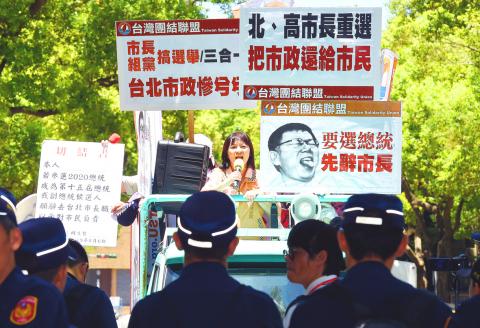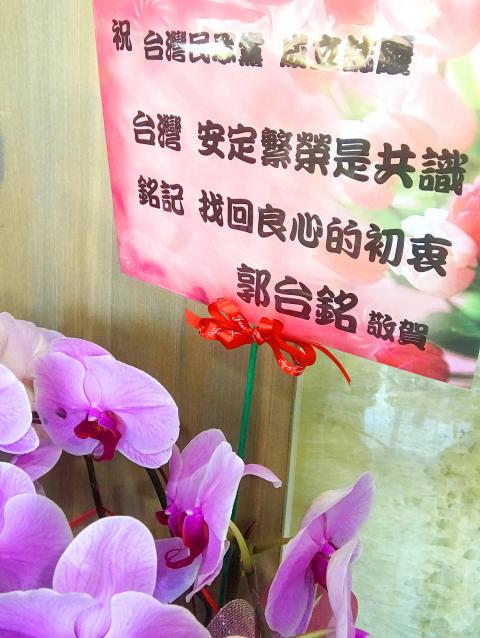The Taiwan People’s Party (台灣民眾黨, TPP) was formally established yesterday in Taipei, with the party announcing its constitution and the election of Taipei Mayor Ko Wen-je (柯文哲) as its chairman.
The founding ceremony was held at the National Taiwan University Hospital International Convention Center, with hundreds of people attending.
Ko arrived shortly past noon and was welcomed by enthusiastic chants of: “Taiwan’s choice — Ko Wen-je,” “The best choice — Ko Wen-je” and “The party members’ choice — Ko Wen-je” — similar to the slogans used during his mayoral re-election campaign last year.

Photo: Liu Hsin-de, Taipei Times
The party has 111 founding members, with 72 attending the morning meeting to decide the party’s constitution and elect a chairman, a cohost of the event said.
The founding members include members of the Ko administration — adviser Tsai Pi-ju (蔡壁如), Secretary-General Chang Jer-yang (張哲揚), spokesman Liu Yi-ting (劉奕霆) and deputy spokespeople Ke Yu-an (柯昱安) and Huang Ching-ying (黃?瑩) — and Taipei Rapid Transit Corp (台北捷運) chairman Lee Wen-tsung (李文宗).
Ko said that the TPP was founded to change Taiwan’s political culture, as the ideological battle between the two major parties has left the nation in a rut and led to friction over the past two decades.

Photo: Liao Chen-huei, Taipei Times
He said that his foremost principle is to promote the nation’s “general interests and the public’s maximum well-being.”
The biggest problem that Taiwanese politics has faced since 2000 is the destruction of the civil service system, because policies can be suddenly changed by political forces, without professional and technical discussions, unlike the past when there were technocrats, he said.
“While honesty and diligence should be basic requirements of government, they have become rare in today’s Taiwan,” he said, adding that the government needs to improve governance, regain the public’s trust and highlight the nation’s value to the world with a graft-free government.

Photo: CNA
Ko reiterated that he believes “Taiwanese values” are the implementation of universal values in Taiwan, including democracy, freedom, diversity, openness, rule of law, human rights, caring for the underprivileged and sustainable development.
“The TPP we established today is the coming together of ideas. We are not political leaders, but rather hope to become preachers of culture,” he said.
Public opinion, professional expertise and values are the three most important elements in decisionmaking, he added.
According to the party’s charter, the TPP conforms to the existing constitutional system and aims to strengthen national governance, enhance national interest and abolish corruption.
It will take a practical approach in foreign relations to ensure Taiwan’s survival and protect its sovereignty, it says.
Hon Hai Precision Industry Co (鴻海精密) founder Terry Gou (郭台銘) and Chinese Nationalist Party (KMT) Legislator Wang Jin-pyng (王金平) sent flowers to congratulate the party on its founding.
Gou’s gift came with a card that says: “Remember the reason it all started. It is our shared goal to ensure Taiwan’s stability and prosperity.”
Wang’s gift came with a message calling for solidarity to ensure peace and stability for Taiwan.
Gou’s and Wang’s gifts were the only flower baskets placed at the entrance of the venue.
Yonglin Education Foundation chief executive officer Amanda Liu (劉宥彤), a member of Gou’s campaign team, said she attended the event in her personal capacity to offer the party her best wishes.
The event coincided with Ko’s 60th birthday, and the mayor’s parents attended the event, where supporters shouted “Happy birthday” to Ko.
Outside the venue, several members of pro-independence groups and self-styled “Ko haters” staged a rally and called on Ko to resign as mayor if he runs for next year’s presidential election.
Additional reporting by Ann Maxon

NATIONAL SECURITY THREAT: An official said that Guan Guan’s comments had gone beyond the threshold of free speech, as she advocated for the destruction of the ROC China-born media influencer Guan Guan’s (關關) residency permit has been revoked for repeatedly posting pro-China content that threatens national security, the National Immigration Agency said yesterday. Guan Guan has said many controversial things in her videos posted to Douyin (抖音), including “the red flag will soon be painted all over Taiwan” and “Taiwan is an inseparable part of China,” while expressing hope for expedited “reunification.” The agency received multiple reports alleging that Guan Guan had advocated for armed reunification last year. After investigating, the agency last month issued a notice requiring her to appear and account for her actions. Guan Guan appeared as required,

A strong cold air mass is expected to arrive tonight, bringing a change in weather and a drop in temperature, the Central Weather Administration (CWA) said. The coldest time would be early on Thursday morning, with temperatures in some areas dipping as low as 8°C, it said. Daytime highs yesterday were 22°C to 24°C in northern and eastern Taiwan, and about 25°C to 28°C in the central and southern regions, it said. However, nighttime lows would dip to about 15°C to 16°C in central and northern Taiwan as well as the northeast, and 17°C to 19°C elsewhere, it said. Tropical Storm Nokaen, currently

‘NATO-PLUS’: ‘Our strategic partners in the Indo-Pacific are facing increasing aggression by the Chinese Communist Party,’ US Representative Rob Wittman said The US House of Representatives on Monday released its version of the Consolidated Appropriations Act, which includes US$1.15 billion to support security cooperation with Taiwan. The omnibus act, covering US$1.2 trillion of spending, allocates US$1 billion for the Taiwan Security Cooperation Initiative, as well as US$150 million for the replacement of defense articles and reimbursement of defense services provided to Taiwan. The fund allocations were based on the US National Defense Authorization Act for fiscal 2026 that was passed by the US Congress last month and authorized up to US$1 billion to the US Defense Security Cooperation Agency in support of the

PAPERS, PLEASE: The gang exploited the high value of the passports, selling them at inflated prices to Chinese buyers, who would treat them as ‘invisibility cloaks’ The Yilan District Court has handed four members of a syndicate prison terms ranging from one year and two months to two years and two months for their involvement in a scheme to purchase Taiwanese passports and resell them abroad at a massive markup. A Chinese human smuggling syndicate purchased Taiwanese passports through local criminal networks, exploiting the passports’ visa-free travel privileges to turn a profit of more than 20 times the original price, the court said. Such criminal organizations enable people to impersonate Taiwanese when entering and exiting Taiwan and other countries, undermining social order and the credibility of the nation’s